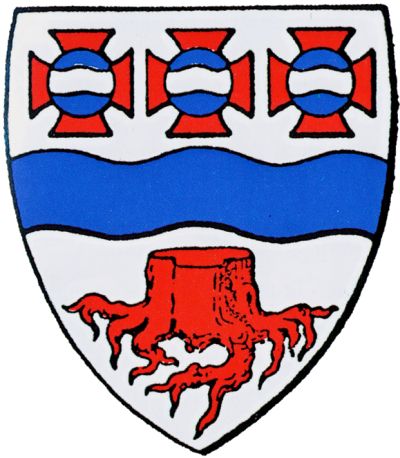Langå: Difference between revisions
Knorrepoes (talk | contribs) m (Text replace - "'''Origin/meaning :'''<br/>" to "====Origin/meaning====") |
Knorrepoes (talk | contribs) m (Text replace - "[[Literature" to "{{media}} [[Literature") |
||
| Line 19: | Line 19: | ||
The blue wavy bend symbolises the Gudenå river, marking the southern border of the municipality. The three crosses with a heraldic fountain symbolise the three holy wells in the municipality, and at the same time the three villages. The tree trunk is derived from the arms of the medieval Middelsom county seal, in which the present municipality is situated. | The blue wavy bend symbolises the Gudenå river, marking the southern border of the municipality. The three crosses with a heraldic fountain symbolise the three holy wells in the municipality, and at the same time the three villages. The tree trunk is derived from the arms of the medieval Middelsom county seal, in which the present municipality is situated. | ||
{{media}} | |||
[[Literature]] : Achen, 1982 | [[Literature]] : Achen, 1982 | ||
Revision as of 00:31, 9 July 2014
| Heraldry of the World Civic heraldry of Denmark - Danmarks Kommunevåbener |
LANGÅ
Region : Midtjylland
Amt (until 2007) : Århus (until 1970 Randers)
Additions : 1970 Houlbjerg-Granslev, Langå-Torup-Sønder Vinge (partly), Laurbjerg-Lerbjerg (partly), Værum-Ørum, Øster Velling-Helstrup-Grensten
Incorporated into : 2007 Favrskov, Randers
Origin/meaning
The arms were adopted in 1961 by the then Langå-Torup-Sønder Vinge municipality.
The blue wavy bend symbolises the Gudenå river, marking the southern border of the municipality. The three crosses with a heraldic fountain symbolise the three holy wells in the municipality, and at the same time the three villages. The tree trunk is derived from the arms of the medieval Middelsom county seal, in which the present municipality is situated.
Contact and Support
Partners:
Your logo here ?
Contact us
© since 1995, Heraldry of the World, Ralf Hartemink 
Index of the site
Literature : Achen, 1982











